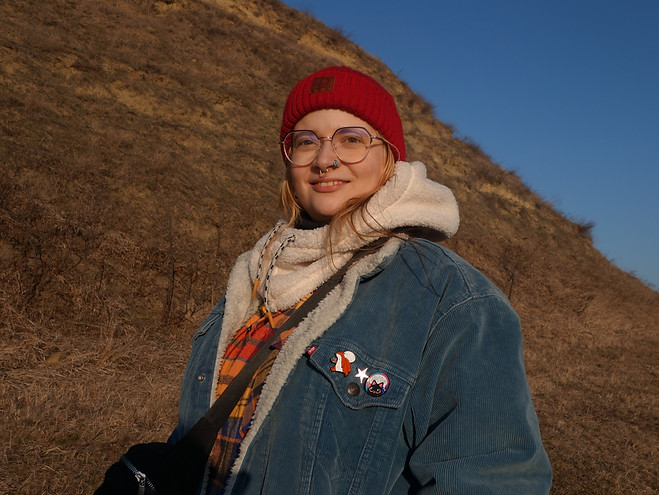
spring


NÓRA UGRON
Nóra Ugron (she/they) is a poet, queer-feminist anarchist, and anti-speciesist activist and a member of several radical left collectives in Romania and transnationally. They are a member of the queer–feminist literary circle Cenaclul X, coordinator at ELMO (Eastern European Left Media Outlet) and a contributing editor at LeftEast. Nóra is a Doctoral Researcher in Gender Studies at the University of Turku, Finland. Their debut poetry collection in Romanian, Orlando Postuman (Posthuman Orlando), was published at Fractalia in 2022, and in 2024, an audiobook version, by Magga Books. A Serbian translation of the book is currently under publication. Ten of Nóra’s poems were recently translated to Croatian for the Queer Balkan anthology of the Review of Small Literatures literary festival. Together with other members of Cenaclul X, they co-edited two anthologies: Luminișuri. Antologie de literatură queer ecologică (Meadows. Anthology of queer ecological literature, 2022) and Tranziții. Antologie queer est-europeană (Transitions. Queer Eastern European Anthology, 2024). During the Șona AIR residency, they worked on the second volume of poetry, Uimirea-frică a pământului (The Awe-Fright of the Earth). They gathered texts written since 2023 and developed their ideas over time so that during the 11-week residency they could finalize the manuscript with the necessary care and attention to detail. The volume continues the ecological themes and the theme of queer love developed in Orlando Postuman. The concept of awe-fright, found in the poems and texts included, is more than a simple juxtaposition: it attempts to convey a tangled feeling of awe and fear, in which awe for the world is overwhelming, a mixture of terror and love. Love is also at the center of the volume, in the form of love for the world and other beings, self-transforming love, and queer love. In the structure of the manuscript, the central place is dedicated to a lyrical prose text that explores possible answers to the question "what is love?" Uimirea-frică a pământului, like the previous volume, decenters the human subject as the main and only subject of literature and highlights the agency of non-human animals, as well as plants and fungi. In their time in Șona, Nóra wrote a poem dedicated to the black stork, inspired by the visitors that come every spring on the pole in front of the Blue House. They spent their time writing, cooking, and taking walks in the surrounding area, using the spring season to witness the changes that we often overlook in city life.



MARIA OBLICKA
ALEX CABEZA TRIGG
Maria Oblicka and Alexander Cabeza Trigg form a collaborative duo exploring intersections of art, anthropology, and participatory storytelling. Șona AIR brought the opportunity for Maria and Alex to bring a project to completion–Utkane, a film centered on the life and work of Krystyna Wojtyna-Drouet, the last living representative of the Polish School of Textile. Despite the artist’s significant achievements both nationally and internationally, she remains largely unknown to the wider public. This film seeks to capture and preserve, through a feminist perspective, her remarkable personality and boundless imagination. Rather than a strict biography, their goal is to create an intimate portrait of an artist with an extraordinarily rich inner world that developed in response to her difficult experiences during the war. The images captured reveal her studio as well as her private spaces (her home and her garden plot), and celebrate the delicate and artistic nature of Wojtyna-Drouet. This current-day portrait of a textle artist is an entry point into a tapestry of archival material—photos, travel videos, and more. Maria and Alex dedicated their time in the residency to editing and post-production work. In Șona they found the ideal environment to finalize the film, quiet and remote, creating an artwork that will enable Krystyna’s story to reach a broader audience. Maria Oblicka is a multidisciplinary artist, filmmaker, and sculptress from Warsaw. She works on the cross section of sculpture, site-specific installation, and film. In her work, she explores the topics of oppression, acoustic democracy, and feminism. She exhibited in Cuterim Gallery in Berlin, Zachęta National Gallery, Bauhaus-Dessau, KV Gallery in Leipzig, Jazdow Gardens in Warsaw, Hangar and Salto Gallery in Lisbon, Tabacka Gallery in Kosice, and Przyszla_Niedoszla Gallery in Warsaw, among others. She co-founded the Warsaw permaculture gardening collective and cultural space Krzak Collective and co-created a sustainable linen brand, ŁYKO, winner of the Must Have Ł.dź Design Award from the International Łodź Design Festival. Alexander Cabeza Trigg is an anthropologist and filmmaker from Barcelona, Spain. His work seeks to conjugate the reflexive and participatory qualities of anthropology with the freedom and ambiguities that a more experimental approach allows. This results in a shared documentary practice that is grounded in a local setting and closely involves participants in the creative process. He is a tutor in the MA Photography and Society at the The Royal Academy of Art in the Hague (KABK). His films have been screened in DocLisboa, Documenta Madrid, Festival dei Popoli, Punto de Vista, D’A and CCCB (Center of Contemporary Culture of Barcelona). Other than working, Maria and Alex found the rhythmic and ”monastic” way of living in Șona calming in comparison to the fast-paced cities they live in. Besides walking and documenting the surrounding area of the village, they also experimented with ferments–homemade sourdough and various pickles.


